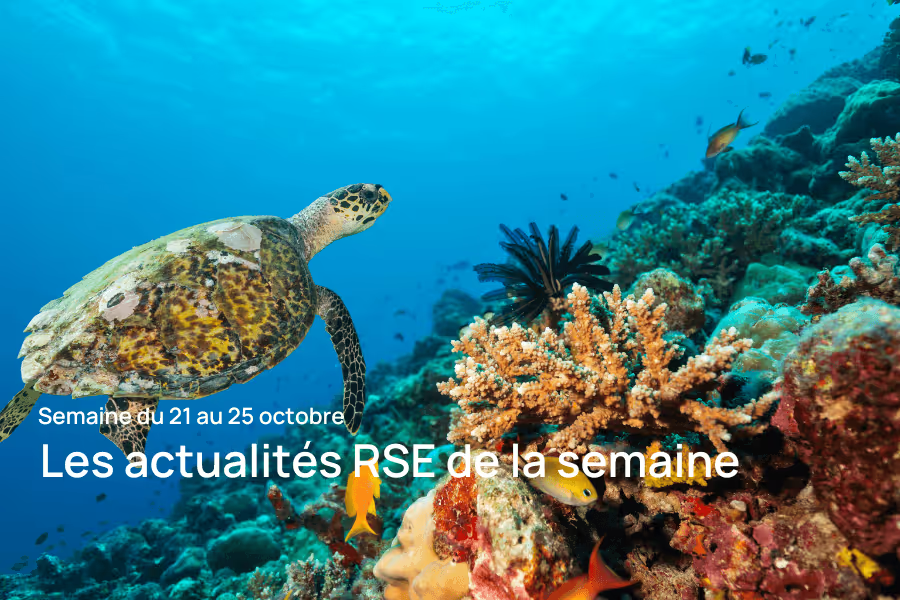This week in CSR news, we discuss how political and economic debates are influencing regulatory commitments, in particular the French government's desire to review CSRD deadlines, which could weaken the ambitions of the European Green Deal.
We will also find the main figures from COP16 Biodiversity, the challenges of inclusive governance, and other current CSR challenges for companies, States and civil society.
Happy reading!
Will the Barnier government postpone the CSRD?
In the Sunday Newspaper, Prime Minister Michel Barnier said he wanted a “moratorium” for certain regulations, especially pointing the finger at EU sustainable transition policies such as the CSRD or the duty of vigilance.
Referring to the need for regulatory simplification, Michel Barnier affirms the possibility of “postpone the dates of entry into force of very heavy regulations for two or three years”. Thus, the European Green Deal is being directly questioned by the French Head of Government: a first.
According to Arnaud Gossement, a lawyer specializing in environmental law, this statement is hazardous since such a delaying approach would place France outside of European law. To this extent, it is “dangerous” since it could generate confusion among companies that are then likely to be less committed to the implementation of their CSR impact reports.
The main figures of COP16 Biodiversity
COP16 Biodiversity opened on October 21 in Cali, Colombia. It aims to deepen the Kunming-Montreal Agreement adopted in 2022, in order to reverse the trend of the destruction of life on land and in the oceans.
- 20 billion dollars: this is the financial commitment promised for 2025 for biodiversity.
- 230 companies: their mobilization is particularly important for this COP16. A “target” is specifically dedicated to them.
- 18,000 participants: Never was there so much enthusiasm for a biodiversity COP, and never were there so many heads of state present.
- 31 biodiversity strategies: Only 31 countries have published their “NBSAPs”, out of 196. In addition, 70% of the world's biodiversity is sheltered by 17 countries. Among them, only 5 will be there...
- 23 targets: Indicators and monitoring procedures contained in the Kunming-Montreal Agreement, whose implementation this COP16 Biodiversity intends to deepen.
INSEE: the gender wage gap persisted in 2023
According to recent figures published by INSEE, the wage gap between women and men in full-time equivalent terms continues to reflect wage inequalities linked to gender. However, the Institute of Statistics notes that this gap “continues to narrow.”
With a net salary of €2,508 per month on average, women earned 13.5% less than men in 2023. They received an average of €2,898 net. However, “This gap has narrowed by 0.5 points compared to 2022 and by 7.4 points since 2008.”
It is remarkable that these differences are also found among the 1% of the highest salaries in the private sector, where they represent only 23.5% of the best paid employees. A situation that, despite improvements, indicates the persistence of sexist biases in the professional world.
Inclusive governance and decision sharing
In an interview she gives to the media Carenews, the businesswoman Mireille Faugère (former director of the Paris hospitals) pleads in favor of better decision sharing in organizations. More specifically, it invites businesses to better “putting the user at the heart of the service offer”.
This approach consists in including user associations in the decision-making process. In particular, certain minorities of users such as people with disabilities. This provides a plurality of viewpoints on boards of directors, and generates more inclusive and informed governance.
Fundamentally, this dynamic means “sharing decision-making power with those first concerned”.
Is the employment of people with disabilities under threat?
Major budget cuts are to be expected in the Agefiph budget (Association for the management of the fund for the professional integration of disabled persons). Indeed, the 2025 Finance Bill (PLF) could threaten the assistance provided to the social and professional integration of people with disabilities.
In fact, it is a question of capping financing at 457 million euros for 2025. This represents a decrease of 20% compared to fiscal year 2024.
To date, the association's resources come directly from the penalties awarded to companies that do not pursue sufficiently ambitious inclusion policies. The 2025 PLF therefore intends to cap them in order to “recover the excess”, i.e. nearly 100 million euros.
French companies still in the dark about CSRD
As part of its annual review of reporting practices, Tennaxia consulted the opinions of 200 French companies. This study shows that 76% of respondents did not realize their “double materiality analysis”. However, this approach, which intends to take into account the financial and CSR impacts of companies, is supposed to be the basis for the sustainability reports that they will have to submit in 2025.
Another worrying figure: 67% of respondents have not yet established a team specialized in the governance of extra-financial data. In addition to a certain delay in regulatory obligations, this reflects a lack of taking seriously the transformative challenges of CSRD by companies.
Finally, this overview shows a strong desire to outsource reporting, since 61% of companies are looking for an external service provider to support and advise the process.
2 680 billion in subsidies harmful to the environment
In 2023, 2,680 billion dollars in grants would have been paid by states to projects harmful to the environment and to the balance of ecosystems, according to a study recently published by Earth Track. This amount corresponds to 2.5% of global GDP.
This estimate is 800 billion dollars higher than in 2022. Such a trend is due in particular to “the increase in subsidies, especially for fossil fuels”. It should be noted that indexed to inflation, this amount corresponds more precisely to the sum of 570 billion.
As far as France is concerned, the amount of State subsidies paid to projects harmful to the environment and biodiversity amounts to €10.2 billion. It is “4 times more than favorable expenses”. They are mainly directed towards certain agricultural practices and the artificialization of soils.
European industry far from decarbonization goals
The Institut Montaigne, a liberal Think Tank, has published a report in which they urge the EU to accelerate its energy transition, if it wants to honor its commitment to European carbon neutrality in 2050. As a reminder, industry accounts for 10% of GHG emissions across the continent.
The challenge of maintaining European industrial competitiveness remains an essential element in the equation. It is the thorny question of the balance between this competitiveness and an ambitious energy transition policy that the Institute is addressing, asking the question of the “industrial strategy for the post-carbon era”.
They propose better coordination between European industries to avoid any risk of competition between them. On the other hand, they underline the crucial importance of being “self-sufficient” across the entire green technology value chain, so as not to depend on China for example.
Forests, carbon sinks that are becoming less and less effective
Forests are very important carbon sinks, i.e. natural reservoirs for sequestering GHG emissions. In normal times, they absorb nearly 20% of man-made emissions. However, specialists are concerned that CO2 capture performance may have drastically decreased in 2023, which has a direct influence on our ability to fight global warming.
This situation is explained by repeated droughts and fires, especially in Canada, Siberia and the Amazon. More precisely, these oxygen “lungs” have in part been transformed into direct emitters of GHGs.
Thus, this situation is a veritable vicious circle in which the remedy can sometimes turn into poison: where the forest itself becomes a GHG emitter.
Investing $1 trillion in AI to support CSR?
In a recent report produced by Goldman Sachs, the bank recommends an investment of $1 trillion over 10 years by companies in artificial intelligence systems, in order to benefit their decarbonization trajectories.
For example, while 68% of employees “regularly” use generative AIs (according to BCG), two-thirds of companies only use free versions of them. However, in terms of productivity, the gains could be +7% for 2034 depending on the potential trajectory identified by the study.
Thus, the race to master AI models on the one hand, and the race to drastically reduce the carbon impact on the other would be two complementary challenges for companies. A source of opportunities, the study sees them as an investment.
The sources
Novethic: “Michel Barnier wants a moratorium on CSRD and environmental regulations”
Novethic “COP16 Biodiversity: Five figures to understand the challenges”
Les Echos “How wages have evolved in France in the face of the inflationary shock”
Carenews “Mireille Faugère, putting the user at the center of the service offer”
Carenews “Deputies table an amendment against the reduction of the Agefiph budget”
Novethic “The CSRD makes French companies doubt”
Youmatter “The equivalent of 2.5% of global GDP spent on subsidies harmful to biodiversity”
Le Monde “The “embryonic” decarbonization of European industry”
RSE Magazine “The worrying drop in carbon absorption by forests in 2023”
Bon à savoir : Lorem ipsum dolor sit amet, consectetur adipiscing elit, sed do eiusmod tempor incididunt ut labore et dolore magna aliqua. Ut enim ad minim veniam, quis nostrud exercitation ullamco laboris nisi ut aliquip ex ea commodo consequat. Duis aute irure dolor in reprehenderit in voluptate velit esse cillum dolore eu fugiat nulla pariatur.


.avif)


